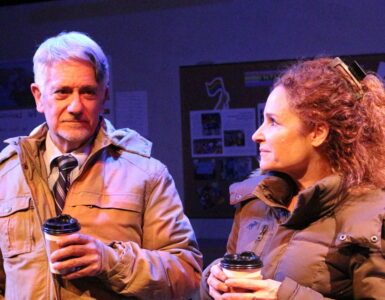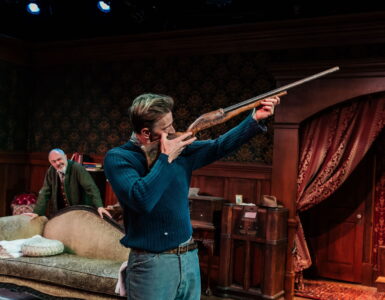Udo Kier, the German cult actor with the piercing blue eyes whose career stretches back to the 1960s, makes a memorable impression in Todd Stephens’ poignant comedy-drama Swan Song.
Set in Stephens’ hometown of Sandusky, Ohio, Swan Song relates the story of Pat Pitsenbarger, a real-life local legend. He was a flamboyant hairdresser in a place and time where such things shouldn’t be, but he was beloved by the locals nevertheless. He was especially adored by the society matrons, who clamored for his hairstyling services. Keir inhabits this role with relish, shamelessly camping it up at times but always maintaining the mournfulness of the character just below the surface.
After having suffered a stroke, he’s been sitting in a nursing home, bored to death, for God knows how long. He folds dinner napkins and chain-smokes to pass the time. He receives a visit from Walter Shamrock (Tom Bloom), a lawyer in charge of the estate of the recently deceased Rita Parker Sloan (Linda Evans). Shamrock tells him that there’s a $25,000 provision in her will for him to do her hair and makeup one last time. But Rita had stopped speaking to Pat years before, and he assumed it was because she was disgusted by the fact he lived openly with his male partner. “Bury her with bad hair,” he snaps with contempt. But later in his room, he looks over a secret cache of memorabilia — mostly involving Rita — and has a change of heart.
He sneaks out of the nursing home and starts his journey on foot to the funeral home where Rita is awaiting her final cosmetic treatment. On the way, he passes familiar places and is occasionally shocked by how things have changed. The beauty supply store where he used to buy his special makeup (which isn’t being manufactured anymore) has become a salon for African-American women. It’s a great scene, however. And he is heartbroken to discover that the house he once shared with his lover has been razed.
Stephens utilizes the technique of Pat talking to live people but also being visited by the ghosts of his past to tell his story. For example, Pat keeps stopping at public men’s rooms, crying out for “Eunice,” an old pal that he expects to find still waiting there, cruising for some action. And there are several flashbacks of life with his partner David (producer Eric Eisenbrey), who’d been an early victim of the AIDS crisis. A particularly moving moment arrives when he goes to the cemetery to kneel at the grave where both of their names are forever enshrined.
He makes a stop at the Fruit and Nut, the sole gay bar in town, and is dismayed to see that it, too, is soon to be gone. He tells Gabriel (Thom Hilman), the somewhat disbelieving kid behind the counter, how he used to do a drag show on weekends as “Mr. Pat” — and he was the toast of the town. They could be free to be themselves in bars like this, but in the age of Grindr, such communal meeting places have become unnecessary.
The cameo scenes with other notable actors are effective. When Pat stops by Rita’s palatial home, he is greeted by her grandson, Dustin (Michael Urie), who clearly appreciates his history as a groundbreaker.
But he has other scores to settle. He visits the salon of his former assistant, Dee Dee (Jennifer Coolidge). Years ago, she’d opened her own competing salon and stolen many of his high-paying clients, leading to his eventual financial ruin. They greet each other like alley cats at first, practically growling and spitting, but reach an eventual truce.
Though it occasionally veers into wish fulfillment territory, Swan Song is held aloft by Kier’s defiantly funny performance. With his well-worn face and still-piercing — but now bloodshot — blue eyes, he steals the show. As Pat, he chain-smokes More (!) cigarettes, wearing a lime-green pantsuit while he sashays down the streets of that small midwestern town. And his performance is immeasurably assisted by Stephens, who knows what this life was like. His previous films, Gypsy 83 and Edge of Seventeen, are proof of his verisimilitude.
Director of photography Jackson Warner Louis does a nice job of contrasting the gray hell of the nursing home with the summery warmness of Pat’s hometown, and its emotional arcs are followed by Chris Stephens’ evocative score. The soundtrack is also bolstered by songs from such gay icons of the past as Shirley Bassey and Dusty Springfield, which emphasize the melancholy feeling of times gone by.
Photos: Chris Stephens







